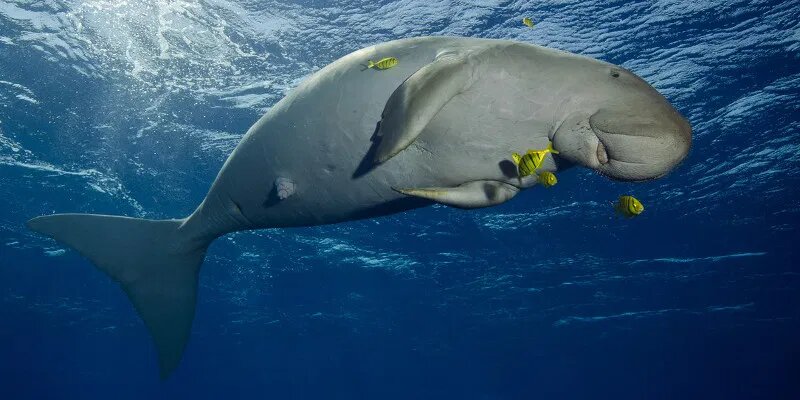Syllabus:
GS3: Conservation, environmental pollution and degradation, environmental impact assessment.
Context:
World Dugong Day is celebrated annually on May 28 to promote awareness and conservation of Dugongs.
Dugong (Dugong dugon)
- Dugongs are the only herbivorous mammals found in India’s marine ecosystems.
- In Indian they are mainly concentrated around the Andaman & Nicobar Islands, Gulf of Mannar, Palk Bay, and Gulf of Kutch. Additionally, they are also found in the Indo-Pacific region.
- They prefer shallow coastal waters due to their dependence on seagrass beds for food and habitat.
- They are strictly marine animals and avoid freshwater ecosystems, unlike their close relatives, manatees.
Dugong dependence on Seagrass:
- Seagrass is low in nutrients, so Dugongs feed extensively throughout the day to meet their daily requirements.
- They primarily feed on seagrasses like Cymodocea, Halophila, Thalassia, and Halodule and can consume 20-30 tonnes of seagrass per day, crushing leaves and stems against their horned teeth before swallowing.
- Unlike other marine mammals, the way they eat allows dugongs to digest cellulose, although the process wears down their teeth quickly. For this reason, dugongs rapidly regrow teeth in multiple iterations throughout their lives.
- Dugongs are often called “farmers of the sea” because they play a crucial role in maintaining the health of seagrass ecosystems by grazing on seagrasses.
Conservation Status

- Dugongs are listed as ‘Vulnerable’ on the IUCN Red List.
- In India, they are considered ‘Regionally Endangered’.
- Dugong is protected in India under Schedule I of the Wildlife Protection Act, 1972.
- Only around 200 individuals are estimated to remain in Indian waters.
Threats include:
- Habitat degradation (pollution, dredging, port construction)
- Risk of Pollution with studies showing the accumulation of mercury and organochlorine compounds in their muscle tissues.
- Seagrass loss from mechanised fishing and coastal development
- Climate change (warming seas, acidification, extreme weather)
- Since they are air breathing mammals, fishing gear entanglement, particularly in gill and trawl nets often leads to their demise.
- Illegal hunting despite their Schedule I protection status in India
- Boat collisions due to their surface-resting behaviour.
UPSC Mains Practice Question
Q. Discuss the ecological importance of dugongs in coastal marine ecosystems and examine the major threats to their survival in India. Highlight recent conservation efforts and suggest a community-driven approach for their protection.

